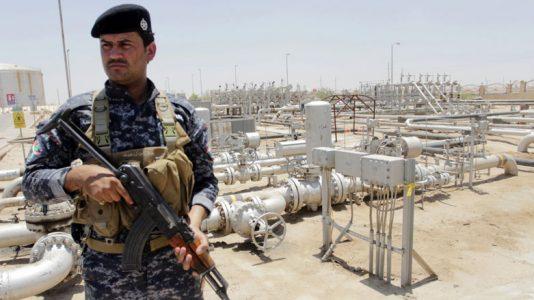
Islamic State sleeper cells in uniform target southern Iraq
After the Nasiriyah massacre authorities fear divided security forces will not be able to stop further ISIS attacks in the south of the country.
Hussien al-Shawili was queuing for lunch at Fadak, a crowded restaurant on the road between Baghdad and Basra in southern Iraq, with his mother and son when the the attack happened.
“Suddenly, we heard gunshots but we ignored it as we thought it was a quarrel, but the shooting became intensive and mixed with screams of women and children,” he told MEE.
Shawili, his family and hundreds of others were caught up in the biggest assault by Islamic State since the group was driven from Mosul, its Iraqi power base, in July – and exposing southern Iraq as vulnerable as the organisation tries to regroup.
“I told my mother that this is the end,” he said from his home in Basra, “as it was a matter of time before the militants finish their work in the front halls and come to where we were.”
The family and around hundred other customers, most of them women, were saved by a restaurant worker who opened a small door leading to the back of the building, from where they fled.
“There were hills and dry waterways. We hid there until the militants left,” he said.
Disguised in military uniforms, IS used SUVs and machine guns to carry out three separate attacks on 14 September at different locations near Nasiriyah, along the road linking Baghdad to the southern provinces, police said, leaving at least 87 people dead, mostly from gunshot wounds and hand grenade shrapnel, medical staff told MEE.
raqi politicians are now talking openly about what many security officials have feared for some time: IS is planning to carry out more significant attacks in the south to compensate for losses in the north and west at the hands of the security forces, backed by the US-led international coalition and Shiia dominated paramilitary troops.
On Tuesday, the Iraqi parliament voted to increase security in the region, including submitting all officials, military convoys, and paramilitary troops to inspections at security check points, and improving the efficiency of security commands in the south.
It came after the parliamentary committee on security and defence on Saturday revealed that intelligence investigations of recently detained IS leaders had confirmed targeting of the region.
Hakem al-Zamili, the committee’s head, said: “All the intelligence information… suggest that the terrorists will move into the south, into the stable areas”.
Zamili added: “The security services were [supposed] to be on alert and take the required measures to protect the innocents.”
But many are angered by the ease with which the wave of attacks took place.
The first assault took place at Fadak, 80km west of Nasiriyah, where at least five attackers attacked diners and others in and around the business area, before stealing two vehicles and heading south, say witnesses and police.
The group clashed with police at a checkpoint 23km away, detonating a car bomb which killed officers and civilians, before heading back the way they had come.
Another two attackers wearing explosive vests detonated themselves near another restaurant located between Fadak and the security checkpoint. A group of civilian vehicles were caught in the blasts, leaving more dead, according to police reports.
Qassim al-A’araji, the minister of the interior, said on Friday that the commander of intelligence for Nasiriyah had been dismissed, the commander of highways detained and the commanders of inspections, interior affairs and urgent response battalions referred for further investigation.
But federal and local police officers told MEE, on condition of anonymity, that all the commanders had been arrested and taken to Baghdad for interrogation.
A senior federal security official, who like others declined to be named, told MEE: “Daesh [IS] has mobilised all its terrorists [sleeper] cells and is back to its old tactics by using governmental wheels and military uniforms to trick our security people and pass through the checkpoints,” a senior federal security official, who declined to be named, told MEE.
“This high number of people would not have been killed if the security services deployed were professional and correctly did their job,” he added.
“The militants had moved through three provinces and no one stopped them, just because they were wearing a military uniform.”
Zamili noted during a televised press conference several factors which helped the attackers, echoing points later made by federal and local security officials to MEE.
They included the laxness of security in the south, the lack of intelligence and negligence and selectivity at checkpoints.
Then there is the lack of cooperation between security agencies.
A local police officer asked MEE sarcastically: “Who would ask for the ID of an official or inspect a governmental vehicle or a vehicle driven by someone wearing a military uniform at the security checkpoints?”
“Whoever does would be jailed for at least five days,” said the officer, who is stationed at a highway checkpoint near Nasiriyah.
“If he was not jailed then he would be moved to serve in a remote area or he would be beaten by the bodyguards of the official,” he added.
Police officers at checkpoints along the highway have shared dozens of similar stories.
Ali told MEE: “A few weeks ago, we asked for the ID of the driver of a military vehicle. He refused to show it and in few seconds the checkpoint was occupied by around 40 Shia fighters.”
Abdulwahid Tuama, a political affairs editor at the Al-Hayat newspaper, told MEE: “The security in the provinces is totally at the mercy of the political parties taking part in the provincial councils.
“As long as they control the top security positions in the provinces, the security situation will keep deteriorating in these provinces and the attacks will be repeated.”
Source: Middle East Eye





